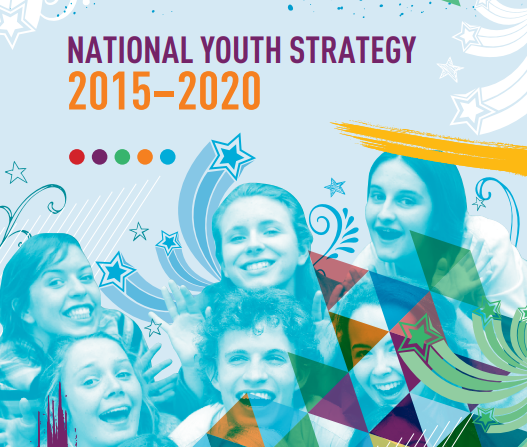Mindfulness, Meditation and Mental Health Support: How Erasmus+ Fosters Wellbeing in Schools
In the stressful time of the Covid-19 pandemic, Pia Janning and Tomás Bulnes from our Programme Support and Development Team explore the importance of mental health and wellbeing in education. They look at the support available for students and teachers, and how wellbeing has become a significant part of national and international policies. Finally they speak to three Irish teachers who have used Erasmus+ School Education funding to promote mental health and wellbeing in their schools.
The Impact of Covid-19 on Mental Health
In recent months, Covid-19 has presented us with unprecedented challenges in all areas of life. As we grapple with our new reality, the issue of mental health and wellbeing in our schools is of particular importance. To find out more, we contacted Carmel Halligan from Jigsaw, the National Centre for Youth Mental Health. Carmel told us about Jigsaw's One Good School initiative, and the mental health support and resources they have available for teachers and students.

"Our lives have been filled with much change and uncertainty at a time when we crave normality, connection and routine. We are more aware than ever of the impact this can have on mental health and wellbeing.
At Jigsaw, our vision is of an Ireland where every young person’s mental health is valued and supported. We recognise the critical role that schools play in the lives of young people. Over the past decade, schools have increased focus on the importance of promoting and supporting mental health. We also recognise the role that principals, teachers and other adults play in supporting the mental health of young people. We need this support across our communities now more than ever."
Minding Mental Health When the Living Room Becomes a Classroom
"With many of us experiencing changes on a daily basis to our home and work life, we are all learning to explore and embrace new ways of connecting. Indeed, Zoom has become the latest family addition for many!
Schools are no different. They are navigating new approaches to work, and few teachers could have anticipated their living room transforming into their classroom. This worldwide pandemic has made us change the way we live, interact and work.
For many reasons however, teaching young people does not easily transition to the ‘working from home’ model. It is impossible to recreate the actions and interactions of the classroom through a digital platform. Naturally, teaching is most effective when we are able to assess the atmosphere, read body language and connect with our students."
Building and Maintaining Connections in a Time of ‘Disconnect’
"We have been supporting school communities across Ireland through our One Good School initiative, which promotes and supports mental health using a whole-school approach.
Recently, we have examined the importance of 'school connection' - the extent to which a young person feels they belong at school, and feels cared for by that community. We know the role of a teacher is more than just providing information on their subject. Teaching involves creating this feeling of connection with and between students. As such, it is often the intangible parts of teaching that mean the most to both students and teachers. Right now, teachers want to help students ground themselves in a world that can feel unstable and insecure."
The Importance of Self-Care
"We have also developed some tools for self-care, including webinars and an online course for teachers. This includes practical tips and support from our clinicians. During these uncertain times, our sense of teaching and support has evolved. It has required time, patience, compassion, creativity and commitment to our students and colleagues. As such, we often forget about looking after ourselves.
However, it is more critical than ever to recognise the importance of minding your own mental health and wellbeing. Take steps to give yourself time, space and respite through tough periods.
Remind yourself that prioritising self-care is a strength, not a weakness. Continue to build your sense of connection in new ways. Be kind to yourself. And most importantly, take time to catch your breath and acknowledge that you are doing all that you can.
For further support and information on self-care, or to view the School Connection webinar, please log on to jigsawonline.ie."

Mental Health and Wellbeing in International Policy
The importance of mental health and wellbeing in education is also increasingly reflected in policy. The World Health Organisation has stated that “Wellbeing is present when a person realises their full potential, is resilient in dealing with the normal stresses of their life, takes care of their physical wellbeing and has a sense of purpose, connection and belonging to a wider community. It is a fluid way of being and needs nurturing throughout life.”
As such, ensuring wellbeing is a focus of the UN Convention on the Rights of the Child. It explicitly notes the importance of physical and mental health, and social, spiritual and moral wellbeing. The EU Youth Strategy 2019-2027 also aims to support the physical and mental health and wellbeing of young people, and "Mental Health and Wellbeing” is one of the European Youth Goals.
Mental Health and Wellbeing in National Policy
At national level, policy in the area of children's and young people's lives features a number of mental health and wellbeing priorities. These policies include the National Youth Strategy 2015-2020 and Better Outcomes, Brighter Futures: The National Policy Framework for Children and Young People 2014-2020. This sets out a number of national outcomes including ‘Active and healthy, physical and mental wellbeing’. This outcome is to be achieved cross-sectorally and collaboratively between government departments, statutory services, agencies and the voluntary and community sectors.
Healthy Ireland: A Framework for Improved Health and Wellbeing 2013-2025 also outlines a vision for Ireland where “…everyone can enjoy physical and mental health and wellbeing to their full potential, where wellbeing is valued and supported at every level of society and is everyone’s responsibility.”

The mental wellbeing of students is paramount
Mental Health and Wellbeing in School Education Policy
In school education in recent years, greater attention has been given to wellbeing in education policy through a range of initiatives. These are outlined further in the DES Wellbeing Policy Statement and Framework for Practice 2018-2023. Wellbeing is also at the centre of Aistear, the early childhood curriculum framework and also features in areas of the curriculum such as SPHE and PE.
There is also a key link between Education for Sustainable Development and the promotion of wellbeing, as noted in the National Strategy for Education for Sustainable Development 2014-2020. This characterises sustainable development as "a continuous, guided process of economic, environmental and social change aimed at promoting the wellbeing of citizens now and into the future."
Finally, during consultations on Junior Cycle reform, teachers and students highlighted the importance of giving concerted attention to student wellbeing. The Framework for Junior Cycle (2015) recognised that young people "require support to make positive responsible decisions relating to their health and wellbeing and the wellbeing of others" and that wellbeing is about "young people feeling confident, happy, healthy and connected”. Consequently, the Junior Cycle Wellbeing Programme was introduced as part of Junior Cycle reform. It requires 400 hours of timetabled engagement in the area of wellbeing being implemented in schools.
Erasmus+ Supporting Mental Health and Wellbeing in Irish Schools
At Léargas, we see the crucial role of education in supporting mental health and wellbeing reflected in Erasmus+ projects. More and more Irish schools are using Erasmus+ to build a community of practice, exchange ideas and develop expertise in the area of mental health and wellbeing.
Erasmus+ projects have helped schools build capacity to support wellbeing, and provided staff with professional development opportunities. By bringing this learning back to the school or organisation, staff have helped introduce new practices into their schools - from holding yoga classes to prioritising the use of positive reinforcement. We spoke to three teachers who have co-ordinated wellbeing-themed Erasmus+ projects in their schools: Carol Fenton from Scoil Mhuire in Allenwood, Co. Kildare; Ronan O'Sullivan from Davis College in Mallow, Co. Cork; and Mikey Prout from Watergrasshill National School in Meenane, Co. Cork. In video conversation with Tomás, they each explained how Erasmus+ and European collaboration has strengthened their work.
Improving Concentration and Self-Esteem in Scoil Mhuire Primary School
Carol Fenton and her colleagues in Scoil Mhuire have worked on four Erasmus+ School Education projects focusing on mental health and wellbeing. The staff group have taken part in courses examining stress, burn-out, meditation, wellness, outdoor education, and positive psychology.
“We gained a wealth of knowledge about what goes on in other schools in Europe,” Carol told us. “It gave us the opportunity to network with teachers across Europe in Greece, Croatia, Slovenia, Czech Republic, and Spain.”
Focusing on positive mental health, resilience and wellbeing, Scoil Mhuire now adopt a holistic approach. The introduction of weekly mindfulness classes with a qualified practitioner reaped considerable rewards: “We found it really helped the children’s concentration and helped improve their self-esteem.”
Following the introduction of yoga and further team-building exercises, the school then turned its attention to its Code of Discipline. “We redrafted the Code of Discipline with a focus on catching the children being good,” Carol explained. “Positive reinforcement for positive behaviour!”
Supporting Students in Times of Flux at Davis College, Co. Cork
Davis Community College faced a number of challenges when the school experienced exponential student growth along with structural refurbishment in recent years.
As Ronan O’Sullivan and his colleagues were concerned for the wellbeing of staff and students during this time, they sought ways to support them during the period of flux.
Their project examined how sport and exercise can improve mental health in school. Partnered with a Scandinavian school, they looked at physical education classes, their structure and the incorporation of activities. This ultimately led to the introduction of yoga at Davis College. As Ronan explains: “Yoga gave people the ability to relax, take time out, and get a little space within the school.” The PE department also created a fitness and wellbeing committee, and gave the students an opportunity to get involved.
Davis College considered the project ‘life-altering’, and found it helped to foster a strong sense of solidarity with European partners.
Tomás chats with Ronan O’Sullivan from Davis College about their Erasmus+ experience
Learning to Manage Anxiety at Watergrasshill National School, Co. Cork
Watergrasshill National School recently started their project ‘Developing Strategies to Promote Wellbeing of the Whole School Community’. This was due to the increasing number of children presenting with anxiety issues in school.
Teacher Mikey Prout believes “the project will be of enormous benefit, particularly to our children with special education needs.” The project will explore how other EU schools tackle mental health issues. They also plan to promote wellbeing and develop whole-school teaching strategies, which will equip pupils and teachers with skills to manage anxiety.
Partnered with four schools from Spain, Portugal, Lithuania and Turkey, Watergrasshill National School led the way in exploring the first topic: yoga. The school devised a lesson plan, demonstrated what they had developed, and ran workshops.
Peer-learning and a strong dissemination strategy is paramount as Mikey is eager to ensure easy access for project partners.
If you have been inspired by these possibilities and would like to explore Erasmus+ opportunities for your school, please contact Deirdre in our School Education section. You can also sign up for our School Education newsletter to learn about future training and funding opportunities.
Images from Pexel.com. We welcome contributions to ‘Insights’ at comms@leargas.ie.
